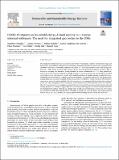| dc.contributor.author | Shupler, Matthew | |
| dc.contributor.author | Mwitari, James | |
| dc.contributor.author | Gohole, Arthur | |
| dc.contributor.author | Cuevas, Rachel Anderson de | |
| dc.contributor.author | Puzzolo, Elisa | |
| dc.contributor.author | ˇCuki´c, Iva | |
| dc.contributor.author | Nix, Emily | |
| dc.contributor.author | Pope, Daniel | |
| dc.date.accessioned | 2022-05-28T12:20:04Z | |
| dc.date.available | 2022-05-28T12:20:04Z | |
| dc.date.issued | 2021-03-21 | |
| dc.identifier.citation | Shupler, M., Mwitari, J., Arthur, G.A., Anderson de Cuevas, R.M., Puzzolo, E., Čukić, I., Nix, E., & Pope, D. (2021). COVID-19 impacts on household energy & food security in a Kenyan informal settlement: The need for integrated approaches to the SDGs. Renewable & Sustainable Energy Reviews, 144, None - None. | en_US |
| dc.identifier.other | DOI: 10.1016/j.rser.2021.111018 | |
| dc.identifier.other | Corpus ID: 233564476 | |
| dc.identifier.uri | https://repository.amref.ac.ke/handle/123456789/717 | |
| dc.description | © 2021 The Author(s). Published by Elsevier Ltd. This is an open access article under the CC BY license (http://creativecommons.org/licenses/by/4.0/). | en_US |
| dc.description.abstract | This longitudinal study presents the joint effects of a COVID-19 community lockdown on household energy and
food security in an informal settlement in Nairobi, Kenya. Randomly administered surveys were completed from
December 2019–March 2020 before community lockdown (n = 474) and repeated in April 2020 during lockdown
(n = 194). Nearly universal (95%) income decline occurred during the lockdown and led to 88% of
households reporting food insecurity. During lockdown, a quarter of households (n = 17) using liquefied petroleum
gas (LPG), a cleaner cooking fuel typically available in pre-set quantities (e.g. 6 kg cylinders), switched
to polluting cooking fuels (kerosene, wood), which could be purchased in smaller amounts or gathered for free.
Household size increases during lockdown also led to participants’ altering their cooking fuel, and changing their
cooking behaviors and foods consumed. Further, households more likely to switch away from LPG had lower
consumption prior to lockdown and had suffered greater income loss, compared with households that continued
to use LPG. Thus, inequities in clean cooking fuel access may have been exacerbated by COVID-19 lockdown.
These findings demonstrate the complex relationship between household demographics, financial strain, diet and
cooking patterns, and present the opportunity for a food-energy nexus approach to address multiple Sustainable
Development Goals (SDGs): achieving zero hunger (SDG 2) and universal affordable, modern and clean energy
access (SDG 7) by 2030. Ensuring that LPG is affordable, accessible and meets the dietary and cooking needs of
families should be a policy priority for helping improve food and energy security among the urban poor. | en_US |
| dc.description.sponsorship | National Institute for Health
Research (NIHR) (ref: 17/63/155) using UK aid from the UK government, Newton Fund and the Medical Research Council (MR/
S009051/1) | en_US |
| dc.language.iso | en | en_US |
| dc.publisher | Elsevier Ltd. | en_US |
| dc.subject | Clean cooking fuels | en_US |
| dc.subject | Liquefied petroleum gas | en_US |
| dc.subject | COVID-19 | en_US |
| dc.subject | Food security | en_US |
| dc.subject | Energy security | en_US |
| dc.subject | Pay-as-you-go | en_US |
| dc.subject | Informal urban settlement | en_US |
| dc.title | COVID-19 Impacts on Household Energy & Food Security in a Kenyan Informal Settlement: The Need for Integrated Approaches to the SDGs | en_US |
| dc.type | Article, Journal | en_US |

